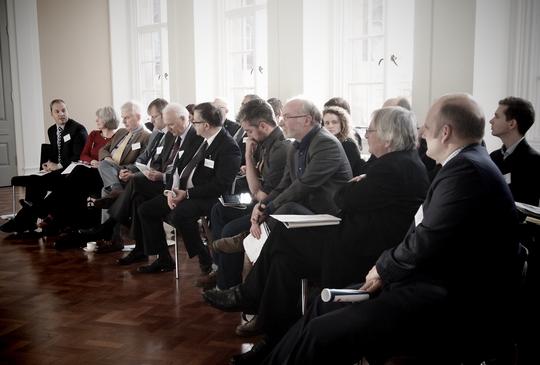
Framing the future, with IPPR’s Great North Plan
Monday, 24 November saw planners, academics and business leaders from across the North of England assemble at Manchester Central Library for a workshop focused on the question of whether we need a singular, coherent plan for transformational infrastructure across the North.
Supported by a number of partners including Arup, Peel Holdings, Amion Consulting and the University of Liverpool the event was being staged by IPPR North as part of their launch of a ‘Great North Plan’ report, celebrating innovative ideas on what they call ‘transformational’ infrastructure: major projects that have a dramatic impact on entire regions in terms of growth, connectivity or sustainability. The workshop followed up directly on an event earlier in the year at Liverpool’s International Festival of Business.
Broadcaster and commentator Jim Hancock opened the workshop with a scene-setter that touched on devolution, Atlantic Gateway, the One North transport plan and, naturally, HS2 and the proposed HS3. He then handed on to IPPR’s Ed Cox who gave a presentation on the potential of infrastructure to create growth, coupled with sobering statistics on the very significant disparities in per capita funding between transport schemes in London and those across the rest of Britain.
Crossrail, London Underground and Thameslink combined are worth more than twice as much as all of the infrastructure investment in the north of England put together.
In just one cited example, he pointed out that London’s Crossrail scheme, alongside improvements to the London Underground and Thameslink will account for £34 billion of public and private investment in infrastructure in the next ten years. Combined, these three projects are worth more than twice as much as all of the infrastructure investment in the north of England put together.
Then the participants began to tackle the key questions of whether a plan is needed, how should it be framed, and how we use infrastructure to help ‘rebalance’ our economy. Contributions came thick and fast from the University’s of Leeds and Liverpool, from a number of planners and urbanists in the audience and private sector players like Peel Holdings. Questions around democracy, the buy in of local people, and the quality of local place-making were raised alongside a running commentary on the London bias of investment at the very same time at which the Chancellor is making noises about ‘rebalancing’ the British economy.

After the workshop, which gave a tentative thumbs up to the development of a plan, IPPR North staged the official awards ceremony for an innovative competition it’s been running on ideas that would transform Northern infrastructure and revitalise the Northern economy.
From concepts that could see Northerners one day be travelling across the Atlantic Ocean in vacuum trains to a plan to get us driving along solar powered roads, according to a new prospectus published today by the think tank IPPR North. The winning idea was one that is already in the public domain: the One North proposal, which links Liverpool, Manchester, Leeds, Newcastle and Sheffield in a 15 year plan of interconnected transport infrastructure.
The £15 billion plan covers air, roads, ports and rail and includes a plan for a high-speed east-west route, essentially an HS3, which has since been endorsed by the government. The proposal, which was submitted by Transport for Greater Manchester on behalf of the five cities involved in its development, won the George Stephenson Prize for industry professionals.
Future roads
The winners of the Great North Plan prize, which sought less conventional and more long-term plans from entrants under 25, all focused on merging car use with renewable energy production. Two of the winners, Ben Puddicombe and Edward Davies, advanced the idea of using solar panels to replace sections of asphalt roads. The third winner, Alexandru Buruiana, looked at harnessing the energy wasted on Britain’s roads through noise, wind speed and braking by bringing harvesting and refuelling infrastructure together.
While recognising that neither the technology nor the demand for these developments is fully realised at this point, the judges praised the creative ideas about how to make our roads more sustainable; “looking ahead, if these technologies could be combined with driverless vehicles then car travel as we know it could be transformed".
Other innovations commended by the judges included a vacuum train from Manchester to New York City and a ‘Green Cities’ proposal, which would see northern cities granted funding in exchange for environmental plans.
Other innovations commended by the judges included a vacuum train from Manchester to New York City and a ‘Green Cities’ proposal, which would see northern cities granted funding in exchange for environmental plans. The panel also commended a proposal for a Pennines National Park, which would protect the entire Pennines range.
“The Chancellor has given every indication that he will announce significant infrastructure investment for the North of England in his forthcoming Autumn Statement,” said Ed Cox, Director of IPPR North. “This is most welcome but the North of England needs a pipeline of proposals for future investment that not only ensure on-going investment, but also shape the kind of economy the North of England needs to become.”
“The One North proposal presents a clear, fundable and ambitious plan for infrastructure in the North and may well become the basis upon which the so-called ‘Northern powerhouse’ of interconnected cities will be built in the next two decades,” he concluded.
The new proposal is available here: http://www.ippr.org/publications/great-north-plan-a-prospectus-for-trans...
Main image inspired by Ian Wray’s submission of a proposed Pennines National Park, created by Map Out.
Think again. Re-imagining sustainable development in the North of England
Contributed by Abigail Gilmore
The Great Leap Forwards: the Northwest's sustainability revolution
Contributed by Steve Connor
Contributor Profile
Steve is co-founder and CEO of Creative Concern. He specialises in ethical and sustainability issues, integrated campaigns, city strategies, brand development and creating strange installations out of trees, lights and beautiful type. Particular areas of expertise include climate change, place making, transport, food issues and the natural environment.




